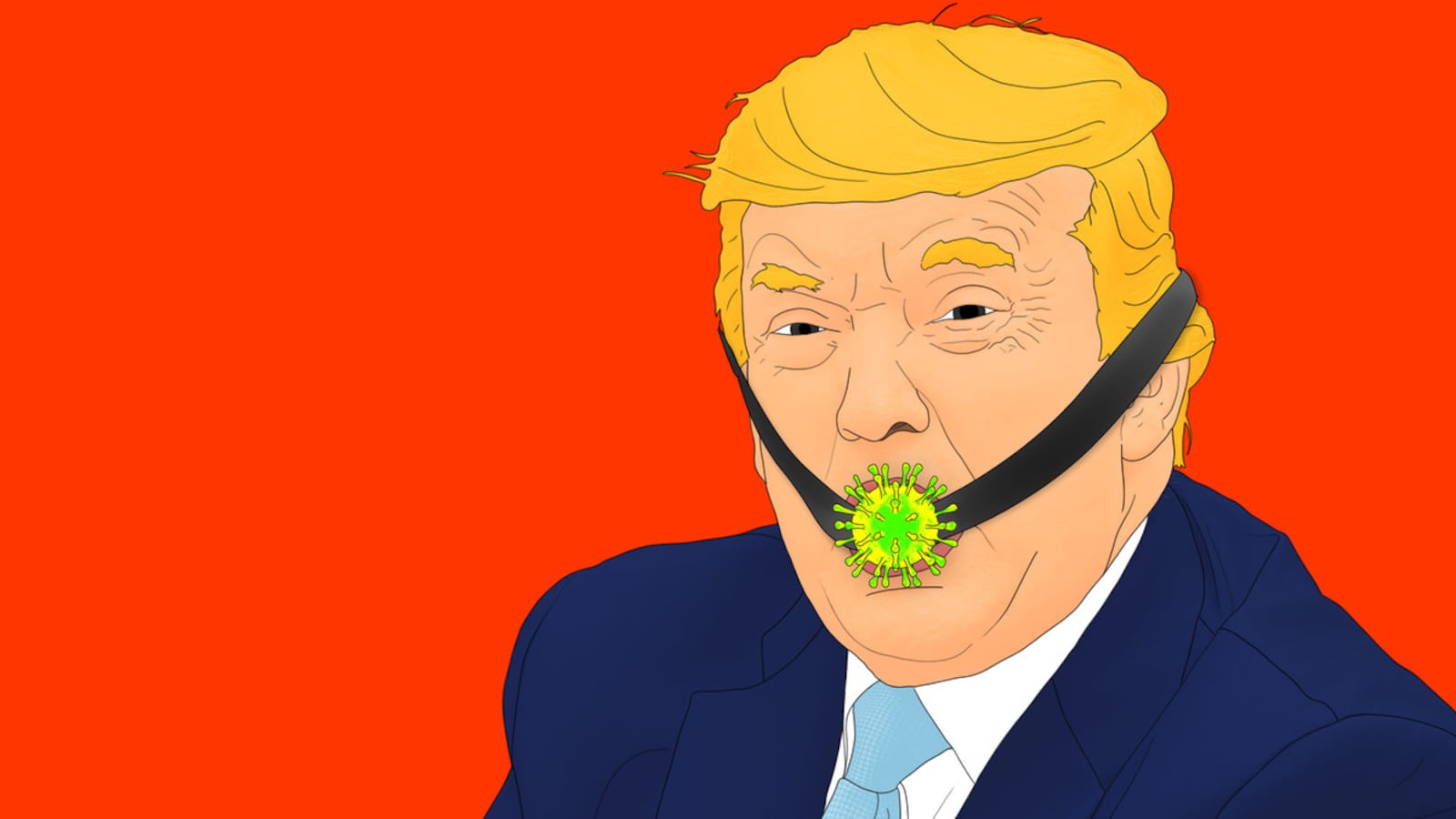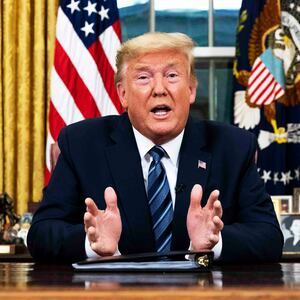It is often said that a crisis reveals a leader’s character. Sadly for all of us, that is certainly true with the coronavirus pandemic and what it has revealed or confirmed about the character or lack thereof of President Donald Trump.
Trump’s handling of this, the first major international crisis of his presidency not of his making, has been a fiasco. The verdict is in. He has failed to rise to the challenge. And he stands exposed before a country contemplating his re-election.
At a time when public buffets are being shut down across America, this crisis has put on display a wholly unappetizing five-week-old smorgasbord of the very worst, most odious, most dangerous and weirdest of Trump.
The novel coronavirus outbreak is the greatest crisis Trump has faced since assuming office. It is not only a public-health debacle, revealing flaws in the U.S. health-care system from top to bottom and putting millions of lives at risk; it has also become an economic crisis marked by severe stock-market shocks and closings and changes in behavior that a number of top economists, like Moody’s Mark Zandi, believe increase the likelihood of the onset of recession this year.
It is also a social crisis in a country like the U.S., in which tens of millions of people lack paid leave or health-care coverage and therefore will be reluctant to seek treatment, a factor that not only increases the chances they will be unable to treat the disease properly should they contract it but which also makes the spread of the disease harder to track or control. It is a political crisis too, for Trump, as this threatens to become his defining failure on the eve of his re-election campaign. And it is now a foreign-policy crisis as steps taken by Trump have done severe damage to important U.S. international relations at precisely the time global cooperation is needed most.
As Americans face this pandemic, the risks associated with it have been made worse by a single organism: the mandemic they elected to lead them.
As with every list of Trump’s prominent character flaws, most notable among those on display during this critical period are narcissism and lying. Even in his Wednesday night Oval Office address to the nation, Trump did not focus on what was needed to be done to make Americans safer; he began and repeatedly returned to self-congratulations for the steps he alleges he took to make America safer—like closing the borders to Chinese travelers early in the crisis. Of course, that is also where the lies began to come in, as he spoke of how effective the U.S. response has been, when all experts agree that the failure to make tests available to people has made it impossible to even know how bad the crisis is. Trump says tests are available to all. But only 11,000 have been administered in the U.S. since the beginning of the outbreak—roughly the number administered in South Korea daily. Trump, of course, has also said the crisis would go away quickly, with the spring, with very few affected by it, but the virus has already put the lie to that. Still, on Thursday, in a meeting with the Irish prime minister, Trump again suggested it would all be over soon.
That lie is the opposite of what the public needs in a moment like this. Trump might know that if he had an ounce of common sense or listened to the experts around him. But he has repeatedly said he needs no experts and the past few weeks have been no exception as he explained that, because his uncle taught at MIT, he had a natural gift for medical matters that dazzled the professionals in his presence. When experts suggested the White House recommend senior citizens avoid air travel, the idea was quashed. When they recommended that Trump bring victims aboard a cruise ship to port, he rejected the idea and said the quiet part out loud when he explained he didn’t want the new patients to screw up the statistics regarding the virus’ spread in the U.S.
He has once again shown that in lieu of experts he prefers loyalists. That is why he put Vice President Mike Pence, a man who actively does not believe in science and oversaw several public-health debacles as governor of Indiana, in charge of the “task force” handling this. And now it’s reported that his top adviser on all this is his son-in-law, Jared Kushner, the man who failed to give us Middle East peace and who has failed in every major business enterprise he has undertaken.
He has bullied those who have demanded the truth, including by again referring to the press as “enemies of the people.” He attacked his political enemies during the crisis, including in one instance calling the governor of the hard-hit state of Washington, Jay Inslee, “a snake.” Susan Glasser counted up the president’s tweets during the past five weeks and discovered that while the biggest category of them were self-congratulatory (see narcissism, above) the next most common type of Twitter outbursts were attacks “on Democrats or the media or both for not giving him credit, or for seeking to create panic rather than recognizing what a good job he has been doing.”
In addition to the lying, narcissism, bullying, rejecting expertise, overstating expertise, valuing loyalty above expertise, and nepotism that we have come to know and expect from Trump, this crisis has also revealed his manifold flaws as an executive and as the head of a government. His speech once again not only revealed a questionable policy decision—banning all travel of Europeans to the U.S., albeit with many exceptions; a decision that was both rather arbitrary and much akin to closing the barn door after the horse has gotten out—but it was also soon revealed that he misstated the specifics of the ban. He stated that it also covered goods coming to the U.S., the kind of thing that has contributed to market jitters every time Trump’s lips move. And we later discovered that none of the countries we targeted were informed of the move in advance, thus breeding animosity with key allies at a vital moment. (The countries in Europe where Trump has hotels, the U.K. and Ireland, were exempted from the decision, pointing to yet another prominent Trump flaw—self-dealing. Or, you can call it by its street name: “corruption.”)
Other policy decisions may have even been worse, including the decision to shut down the National Security Council unit that was created to oversee pandemics and his calls to gut the budgets of the Center for Disease Control and Prevention and the National Institutes of Health, and funding for the World Health Organization. (Some credit here must go to former National Security Adviser and anti-patriot John Bolton, who just didn’t think pandemics were important enough to distract the NSC from its real work of fomenting armed conflict with the small countries he hoped to go to war with.)
Trump politicizes everything, as he did when hours after a speech calling for unity he began again to attack Speaker of the House Nancy Pelosi and Senate Minority Leader Chuck Schumer. He reflexively has blamed others for the crisis—Democrats, Europeans, and the Chinese. His nationalism has led him to give border hawk Stephen Miller the lead in crafting a response agenda that basically involves keeping foreigners out of the U.S. And of course, in weakening the U.S., fostering division across the country, undermining our standing, and attacking our alliances, Trump has also revealed yet another of his defining character flaws: his disloyalty to the country and his oath, and his service to the agenda of the patron who helped get him this job he is so grievously screwing up, Vladimir Putin.
Unfortunately for the president but fortunately for us, some real leaders have emerged during this crisis: truth-tellers who also should serve as an example of how crises like those we face should be managed.
German Chancellor Angela Merkel is one. She gave her people a sober speech this week on the threat the disease poses and did not pull any punches—framing it as a contagion that could infect perhaps two out of three Germans. Flanked by experts, making it clear she was listening to them she said, “We must take all necessary measures. That is true for the government and everyone in a position of political responsibility. But it is also true for all citizens, the 83 million people who live in our country. It is about protecting older people, those with previous illnesses and vulnerable groups.”
Anthony Fauci, of the National Institutes of Health, was another who focused on facts and science in his testimony to Congress and despite the degree to which his views were contrary to Trump’s. But perhaps the best example of how a president should behave came from a source that was unsettling to Trump: his likely November opponent, former Vice President Joe Biden, who on Thursday gave a measured, compassionate, address on the measures he would take to combat coronavirus. If the election were moved up to next week, it would have been the final nail in Trump’s political coffin.
We knew Trump was bad. We knew he was ill-suited for the presidency. But this crisis has driven home the reality that he was worse than we thought. It has reminded us that whenever he is given a choice, Trump will do the worst thing. There was no need for so many of the problems we have faced in the past few weeks or for the pain to come. Testing, swift deployment of resources to health professionals, listening to experts, social programs to take away the shock, telling the truth to people to mitigate panic on Main Street and on Wall Street; all of these were options. Trump rejected them all because they were outside his character and his capabilities, because they involved compassion, humility, wisdom and a sense of service to others. And, in the end, he has deepened this crisis by doing the one thing that all can now see is the most dangerous for the United States of America—by being himself.





